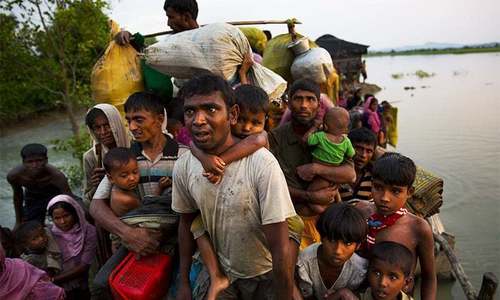KARACHI: “I am a Rohingya and survivor of the ongoing genocide against us. My mother was a survivor of the 1942 massacre, my father was killed in the 1977/78 crisis where many Rohingyas were locked up in a godown with thousands of others waiting to be freed when the lock would open but it never did. The Burmese [Myanmar] regime is rooted so deeply in hatred against Muslims that they will do anything to get rid of us,” said Anwar Shah Arkani, chairman, Rohingya Association of Canada.
He was speaking at an international conference on the ‘Role of minorities in conflict resolution and peace in South Asia’ organised by the Department of Sociology of the University of Karachi in collaboration with the South Asia Research Institute on Minorities at a hotel here on Wednesday. Many scholars from the United States, Malaysia, Sri Lanka, Bangladesh, Nepal and India shed light on the issue besides presenting their research papers.
“There is a calculated and well-executed plan being carried out against the Rohingyas in Burma [Myanmar]. We are told to prove our ancestry from the time when the British colonised India. And even if we do [possess] the paperwork for this, the government people are most uncooperative, making us come again and again after which we are told that our papers are ‘lost’ or are incomplete. If we push to get our work done, we are called hostile so we try to get things done through the backdoor, which means spending lots of money. That’s how many Rohingyas are without documents,” he said.
“Stateless people can’t attend school or college and so the entire race is left illiterate,” he said.
Cynthia Stephen, a social policy researcher from Bangalore, India, said there was really no one minority in one sense. “There are not just religious minorities or linguistic minorities. Women, too, are a minority and they are the most marginalised people. And yet it is women who have the answer to most conflict resolutions,” she said.
“Lasting peace is possible by engaging the most vulnerable people,” she added.
Iqtedar Ahmed from Dhaka said that minorities should not be kept in isolation. “They should be part and parcel of society. It should be like that everywhere or people’s national sentiments get hurt,” he said.
Bhai Tej Singh, president, Ambedkar Samaj Party, India, said that during the last 72 years one has witnessed the agony of Dalit people. “They may come from any walk of life but all are harassed, oppressed, suppressed and victimised. They are being kicked around and killed,” he said.
‘Virtually no freedom in India’
“According to the National Crime Bureau Record of India, the number of registered cases of atrocities against Dalits went up to 167,000 during 2016,” he said while claiming that the minorities, including Muslims, Christians, Buddhists and even Sikhs, have virtually no freedom in India.
Dr Saroj Aglave, head of the Department of Sociology in Nagpur, India, said social security was very important as it is related to human rights of the minority. “There are provisions for social security in the Indian Constitution. But though there are some important programmes for the development of minorities in India, they are programmes on paper only as there is a discriminating attitude and superiority complex found among the majority of the people in India,” she said.
Adjunct Prof Dr Amrik Singh said the problem of South Asian countries is their incapacity to comprehend their colonial past and build a political system that provides opportunities to all citizens so they realise their human potential. He said that British India based its control on playing up religious, cultural, ethnic and caste differences to deprive minorities of their pluralistic nationalism.
Dr Mariyam Shahuneeza Naseer of the Islamic University of the Maldives said that the minority rights approach could be useful in conflict resolution and peace building. “Minority rights are individual and collective rights through which people belonging to national minority groups are entitled to enjoying their own culture, use their own language, to profess and practice their own religion, to have the right to freedom of expression and assembly, to have equal opportunities to education and employment, and to enjoy full participation in public life,” she said.
Syed Imtiaz Ali Shah, provincial secretary for minorities affairs, said that the practice of treating one man differently from another on the basis of social, economic and ethnic grounds seems to have been followed from times immemorial.
Non-Muslim ministers
Senator Gianchand shared that Sindh has two non-Muslim ministers and two special assistants while in the recent past there has been one Hindu judge, Justice Rana Bhagwandas, who also served as an acting chief justice besides being the senior judge of his time.
MPA Mangla Sharma said the provincial and national assemblies are sincerely working on legislation to protect the rights of minorities. “Minorities enjoy complete liberty and freedom and they are living their lives as per their own choices in Pakistan.”
Prof Dr Khalid Mahmood Iraqi, acting vice chancellor of the University of Karachi, said that the situation of minorities is much better in the Islamic Republic of Pakistan which was founded as a secular state in 1947 as compared to other countries in South Asia. “If we reflect on the vision of Quaid-i-Azam Mohammad Ali Jinnah, the idea of the establishment of a secular state will become clear,” he said.
“Minorities are guaranteed fundamental rights according to Islam as well.”
Published in Dawn, July 11th, 2019














































